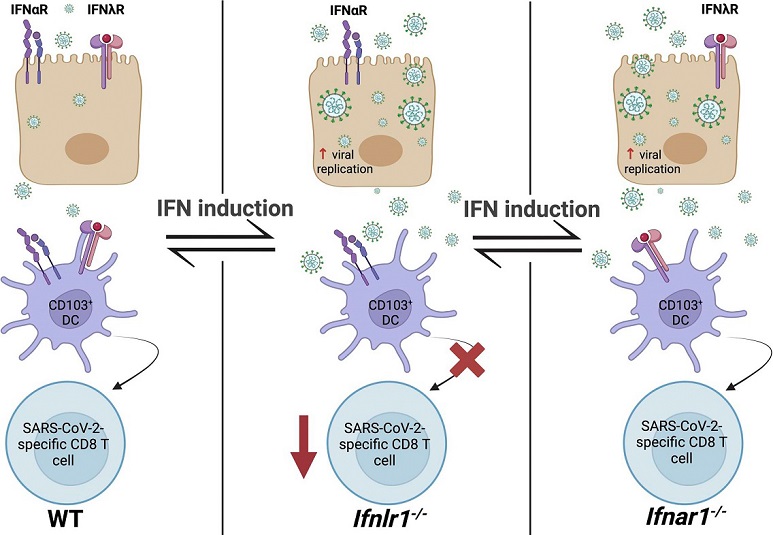Nikhil Prasad Fact checked by:Thailand Medical News Team Jul 10, 2024 9 months, 2 weeks, 2 days, 14 hours, 23 minutes ago
COVID-19 News: Researchers from The Ohio State University-USA have made a groundbreaking discovery about the role of interferon lambda (IFN-λ) in fighting COVID-19. This
COVID-19 News report delves into their findings, which could pave the way for new treatments and vaccines for SARS-CoV-2, the virus that causes COVID-19. The study reveals how IFN-λ can boost the body's immune response against the SARS-CoV-2 virus.
 Graphical Abstract - Interferon Lambda Boost Immune Response Against SARS-CoV-2
What is IFN-λ?
Graphical Abstract - Interferon Lambda Boost Immune Response Against SARS-CoV-2
What is IFN-λ?
Interferons are proteins made and released by host cells in response to the presence of viruses. They allow communication between cells to trigger the protective defenses of the immune system that eradicate pathogens. There are different types of interferons, and this study focuses on type III interferon (IFN-λ), which is known for its role in mucosal surfaces such as the lungs and gut.
The Research Team
The research was conducted by Abigail D. Solstad, Parker J. Denz, Adam D. Kenney, Najmus S. Mahfooz, Samuel Speaks, Qiaoke Gong, Richard T. Robinson, Matthew E. Long, Adriana Forero, Jacob S. Yount, and Emily A. Hemann, all affiliated with the Department of Microbial Infection and Immunity, The Ohio State University College of Medicine, Columbus, Ohio, USA. Additional support came from the Dorothy M. Davis Heart and Lung Research Institute and the Department of Internal Medicine, Division of Pulmonary, Critical Care, and Sleep Medicine at The Ohio State University.
Key Findings: IFN-λ vs. Type I IFN
The researchers compared the effects of IFN-λ and type I interferon (IFN-α/β) on the immune response to SARS-CoV-2. They found that IFN-λ uniquely promotes CD8 T cell immunity against the virus, which is crucial for clearing infections and providing long-term protection. Type I IFN is known for its antiviral properties but can cause inflammation and tissue damage. In contrast, IFN-λ offers antiviral defense with less inflammation, making it a superior candidate for therapeutic use.
Experimental Insights
To understand the role of IFN-λ, the team conducted experiments using mice genetically modified to lack the IFN-λ receptor (Ifnlr1-/-). These mice exhibited more severe symptoms, including increased weight loss and higher virus levels in the lungs, compared to normal mice. This indicates that IFN-λ is essential for controlling the virus and reducing disease severity.
Impact on CD8 T Cells
A significant finding of the study is that IFN-λ supports the generation of protective CD8 T cell responses. CD8 T cells are a type of white blood cell that kills virus-infected cells and are crucial for immunity against viruses like SARS-CoV-2. The researchers discovered that in the absence of IFN-λ signaling, there was a notable reduction in virus-spe
cific CD8 T cells in the lungs and lymph nodes of infected mice. This reduction was not observed in mice lacking the receptor for type I IFN, highlighting the unique role of IFN-λ.
Mechanisms of Action
Further investigation revealed that IFN-λ signaling in dendritic cells (DCs) is crucial for the activation and proliferation of CD8 T cells. Dendritic cells are immune cells that present antigens to T cells, initiating an immune response. In mice lacking the IFN-λ receptor, there was a significant decrease in the number of CD103+ dendritic cells in the lungs and lymph nodes, which are essential for activating CD8 T cells.
Clinical Implications
The study's findings suggest that IFN-λ could be developed as a therapeutic agent to enhance immune responses against COVID-19. Unlike type I IFN, which can cause harmful inflammation, IFN-λ provides a more balanced immune response, limiting virus spread while minimizing tissue damage. This makes it a promising candidate for treating COVID-19, especially in patients with mild to moderate disease.
Future Directions
While the study provides compelling evidence for the benefits of IFN-λ, further research is needed to translate these findings into clinical practice. Ongoing studies are exploring the use of IFN-λ in clinical settings, and future research will focus on understanding the optimal timing and delivery methods for IFN-λ therapy.
Conclusion
This groundbreaking study from The Ohio State University highlights the potential of IFN-λ as a powerful tool in the fight against COVID-19. By promoting robust CD8 T cell responses and providing antiviral protection with minimal inflammation, IFN-λ could play a crucial role in future therapeutic strategies.
The study findings were published in the peer-reviewed journal: JCI Insight.
https://insight.jci.org/articles/view/171830
For the latest
COVID-19-News, keep on logging to Thailand Medical News.
Read Also:
https://www.thailandmedical.news/news/canadian-study-finds-that-interferon-lambda-helps-in-rapid-clearance-of-sars-cov-2-even-in-age-related-delays-in-the-induction-of-t-cell-immunity
https://www.thailandmedical.news/news/interferon-lambda-an-antiviral-protein-being-investigated-for-covid-19-use,-found-to-also-inhibit-lung-damage-repair
